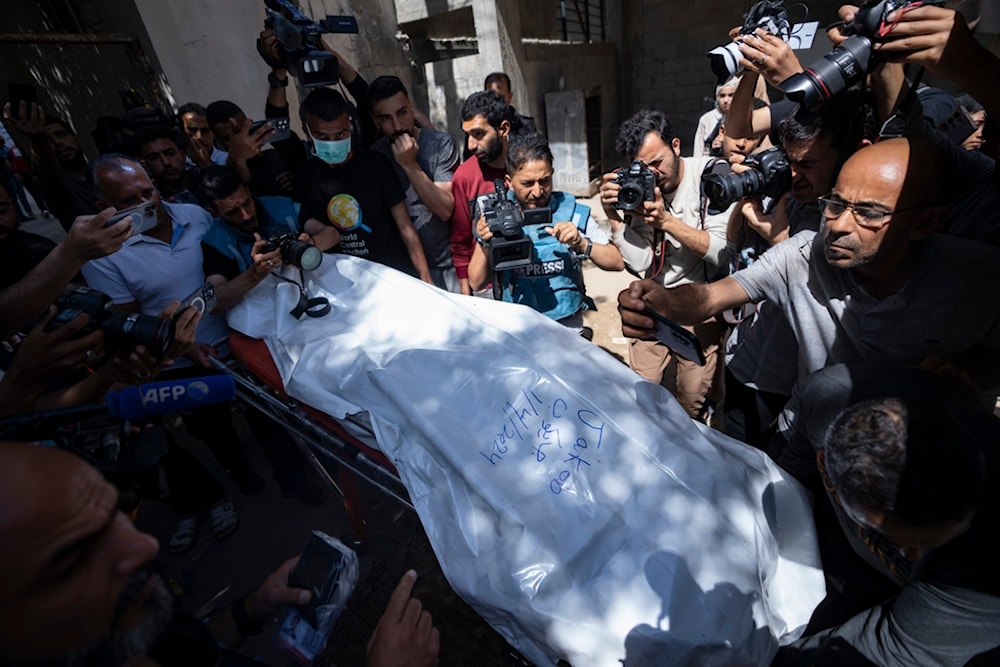'Israel' still attacking UN aid personnel in Gaza a year on: WaPo
A Washington Post reveals that on September 9, Israeli occupation soldiers held a UN convoy at gunpoint for seven and a half hours.
-

Members of the World Central Kitchen aid group transport the body of one of the six foreign aid workers who were killed in an Israeli strike, at a hospital morgue in Rafah, on Wednesday, April 3, 2024. (AP)
Israeli forces have opened fire on UN aid convoys heading to northern Gaza at least four times over the past three months, endangering aid personnel and forcing agencies to be more limited and cautious in how they operate, limiting the amount and scope of aid they can offer, The Washington Post reported, citing UN and humanitarian officials.
These attacks damaged vehicles and narrowly missed injuring staff members inside. On September 9, Israeli soldiers held a UN convoy at gunpoint for seven and a half hours, accusing several individuals in the vehicles of being "wanted men", the report revealed. The individuals were questioned before eventually being allowed to continue their journey.
"They basically surrounded our vehicles, pointing assault rifles at our cars, and they were shouting that we're terrorists," a UN staff member recounted.
"Our colleagues risk their lives to save others and too often come under fire. Throughout this conflict, we have demanded respect for international humanitarian and human rights law. There must be accountability," said Jonathan Whittall, acting head of the UN Office for the Coordination of Humanitarian Affairs in the Palestinian territories.
"In no other context would we accept to operate in such conditions, but in Gaza, people cannot leave the war zone and seek assistance elsewhere."
After a year of Israeli aggression on Gaza, the war-torn Strip has become one of the most dangerous places in the world for humanitarian workers.
280 staffers killed
According to the United Nations, more than 280 aid staffers have been killed in Israeli attacks on depots, convoys, and residential homes. Some of these casualties have resulted from US weapons, according to aid groups. Yet, the United States is showing no signs of slowing down aid to "Israel".
"With 280 aid workers killed in 33 countries last year, 2023 marked the deadliest year on record for the global humanitarian community," the UN Office for the Coordination of Humanitarian Affairs (OCHA) stressed in a statement in August.
The report also indicated that 2024 could potentially be even more deadly, with the Aid Worker Security Database showing that 172 aid workers had been killed by August 7. The increase in fatalities—primarily from Israeli airstrikes in Gaza between October and December of the previous year—marks a 137 rise compared to 2022, which saw 118 aid worker deaths.
Philippe Lazzarini, head of UNRWA, stated on X that the ongoing Gaza war has led to a devastating loss over the past 10 months, with at least 289 aid workers killed, including 207 from UNRWA, as well as 885 health professionals.
Despite ongoing calls for protection, aid organizations report that the flow of essential supplies remains obstructed, and staff safety remains precarious. Last month, six UNRWA team members were killed in an Israeli airstrike while assisting displaced civilians in a shelter.
Israeli forces disconnected
The Washington Post's report highlighted that Israeli checkpoints in northern Gaza are among the most hazardous locations for aid convoys. International aid organizations and others under the United Nations must submit their staff lists to the Israeli Security Ministry's Coordinator of Government Activities in the Territories (COGAT) for approval before receiving clearance to proceed.
Some workers reported that even after receiving the green light, convoys often encounter delays at checkpoints, where identities are re-verified. Humanitarian workers say that Israeli soldiers at the checkpoints are frequently unaware of approvals, leading to confusion and extended hold-ups.
At times, aid workers have to explain to the Israeli soldiers, who seem to be unaware of the situation on the ground, that they have received the official green light to move, as they have to for nearly every step of the way. "You say you’ve got it, but then they say: 'No one told me, so you can't pass,' " said one aid worker with an international group.
Meanwhile, the World Health Organization (WHO) has accused "Israel" of blocking two humanitarian missions attempting to enter northern Gaza, where the besieged region is suffering from relentless attacks and a crumbling health system.
The missions, which aimed to evacuate critical patients and deliver essential fuel, blood units, and medical supplies, were forced to turn back due to Israeli checkpoints and other barriers, the WHO said on Thursday. A total of seven such missions have been denied or obstructed this week.
On July 21, Israeli forces opened fire on a convoy waiting at Wadi Gaza in central Gaza, damaging a vehicle from UNRWA and other UN agencies. Two days later, marked UNICEF vehicles were hit by bullets at the same location, prompting a temporary suspension of staff movements in Gaza.
Cindy McCain, executive director of the World Food Programme (WFP), asked if she believed her team was safe after resuming missions in the area, said, "Not really. There have been a lot of close calls."

 5 Min Read
5 Min Read








